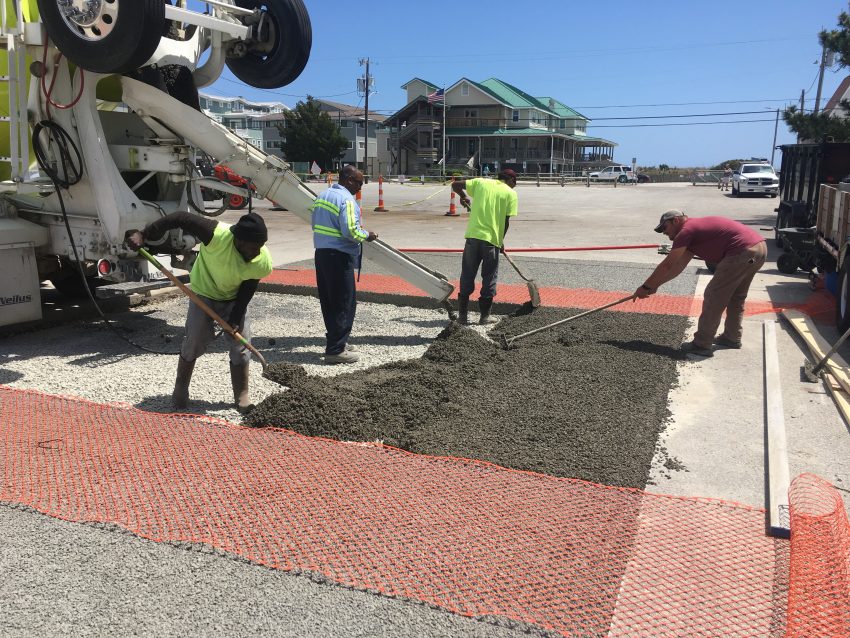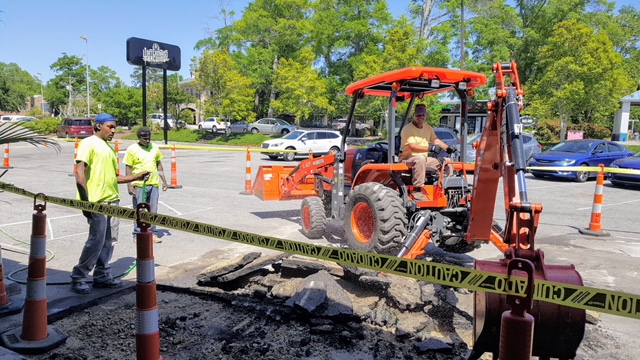WRIGHTSVILLE BEACH — The North Carolina Coastal Federation is working with the Town of Wrightsville Beach, the City of Wilmington and community partners to implement projects that will reduce the volume of polluted stormwater runoff affecting these neighboring coastal communities.

Permeable pavement is installed in Wrightsville Beach.
These projects are funded by the North Carolina Clean Water Management Trust Fund (CWMTF) and the Environmental Protection Agency Section 319 grant program. The projects are part of a communitywide commitment to implement the Bradley and Hewletts Creek Watershed restoration plan, an approved blueprint for cleaning up the coastal watersheds in New Hanover County.
These projects protect waterways from stormwater runoff, which is the top polluter of coastal creeks, rivers and sounds.
The series of stormwater retrofit projects throughout the county includes two sites where impervious paving was replaced by permeable paving at a public parking lot and at Hanover Seaside Club, both in Wrightsville Beach. These sites are both documented sources of polluted stormwater runoff along Banks Channel. These projects, which move runoff through soil to be filtered and cleaned rather than directing it to Banks Channel, were funded by CWMTF.
These projects consist of two interconnected strategies. The first was replacing part of the public parking lot pavement with permeable pavement in November 2017. The permeable pavement infiltrates polluted surface runoff from public streets and a portion of the existing parking lot. The second strategy, completed in April 2018, disconnected multiple street and parking lot drains from stormwater outfall pipes along Banks Channel and redirected them so that runoff moving through the permeable pavement enters an engineered infiltration system located beneath the existing parking lot. Rather than allowing runoff to flow into Banks Channel, this system redirects runoff into the ground to be filtered.
“These projects continue our commitment to cleaning up the recreational waters surrounding Wrightsville Beach,” said Tracy Skrabal, coastal scientist at the federation’s Wrightsville Beach office. “With commitment from partners such as Blockade Runner Beach Resort, the Town of Wrightsville Beach and Hanover Seaside Club, we are demonstrating successful and relatively cost-effective methods to retrofit these developed areas and better protect the water quality of these swimming and fishing waters.”
Construction is also underway to install permeable pavers at the New Hanover County Arboretum and Waterman’s Brewing Company, both of which are in Wilmington.
The permeable paving projects at the arboretum and Waterman’s Brewing are funded by an EPA Section 319 grant to install a series of at least 10 stormwater projects in the Bradley and Hewletts Creek watersheds. These projects are in the City of Wilmington and focus on Bradley Creek. The arboretum project began earlier this year and will be completed by summer. The Waterman’s Brewing project began last week.

Construction at Waterman’s began during the first week of May.
Additionally, the federation received another EPA 319 grant for reducing runoff in Wilmington’s Shandy Point neighborhood, which is a low-density development adjacent to the Intracoastal Waterway. Existing stormwater drains will be disconnected from outfall pipes and redirected to an innovative storage chamber and infiltration pipe system, similar to the technique used at Hanover Seaside Club.
Redirecting the pipe from waterways will reduce the volume of stormwater runoff from the neighborhood by an estimated 80 percent per year.
“Restoring water quality in targeted coastal watersheds is a major priority for the federation,” said Lauren Kolodij, deputy director of the federation. “If we want to continue to harvest oysters or simply swim in these coastal waters, we have to make a commitment to reduce the polluted runoff that is affecting them.”
For more information about these projects, please contact the federation at 252-393-8185. More information about the federation’s stormwater work, including projects completed in 2017 at the Blockade Runner that help reduce the runoff entering Banks Channel, is available at nccoast.org/stormwater.
